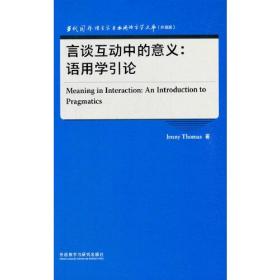
言谈互动中的意义:语用学引论(当代国外语言学与应用语言学文库)(升级版)
全新正版未拆封
¥ 23.58 5.6折 ¥ 42 全新
仅1件
四川成都
认证卖家担保交易快速发货售后保障
作者Jenny Thomas
出版社外语教学与研究出版社
出版时间2021-09
版次1
装帧其他
货号RT
上书时间2023-09-21
- 最新上架
商品详情
- 品相描述:全新
图书标准信息
- 作者 Jenny Thomas
- 出版社 外语教学与研究出版社
- 出版时间 2021-09
- 版次 1
- ISBN 9787521328745
- 定价 42.00元
- 装帧 其他
- 开本 16开
- 纸张 胶版纸
- 页数 272页
- 【内容简介】
- 《言谈互动中的意义:语用学引论》强调语用学的动态研究,对语用学理论和术语追根溯源、透彻分析;章节内容细致清晰,语言文字平白流畅;例句信手拈来,源自大众媒体、小说、日常生活会话等,生动活泼,说服力强。它不只是一本旨在介绍语用学基本内容的教科书,而且对语用现象有颇多新解和独到观察,并对语用学研究存在的一些问题进行了评述,对认识语用现象和进一步从事语用学研究有很大的启发意义和参考价值。
- 【作者简介】
- 珍妮·托马斯(Jenny Thomas),英国语用学者,曾在法国等多国任教,也在英国的兰开斯特大学工作过,后为英国威尔士大学(班戈)语言学系的系主任、教授,现已退休。她还是语言学国际权威期刊Journal of Pragmatics和Text的编委。她的学术兴趣主要集中在语用学、话语分析、跨文化交际等。
- 【目录】
-
Contents
Preface xxxiii
Acknowledgements xxxiv
1 What is pragmatics? 1
1.1 Introduction 1
1.2 Defining pragmatics 1
1.3 From abstract meaning to contextual meaning 2
1.4 Utterance meaning: the first level of speaker meaning 16
1.5 Force: the second level of speaker meaning 18
1.6 Definitions of pragmatics (revisited) 21
1.7 Summary 23
2 Speech acts 28
2.1 J. L. Austin 28
2.2 Ordinary language philosophy 29
2.3 Logical positivism and truth conditional semantics 29
2.4 The performative hypothesis 32
2.5 Utterances as actions 49
2.6 Conclusion 51
3 Conversational implicature 55
3.1 Introduction 55
3.2 H. P. Grice 56
3.3 Implicature 57
3.4 The Cooperative Principle 61
3.5 The four conversational maxims 63
3.6 Flouting a maxim 65
3.7 Other categories of non-observance of the
conversational maxims 72
3.8 Testing for implicature 78
3.9 Conclusion 84
4 Approaches to pragmatics 87
4.1 Introduction 87
4.2 Problems with Grice\'s theory 87
4.3 Grice\'s informal approach 93
4.4 J. R. Searle 93
4.5 Searle’s formal approach to the categorization of speech
acts 105
4.6 Rules versus principles 107
4.7 Conclusion 114
5 Pragmatics and indirectness 119
5.1 Introduction 119
5.2 Pragmatics and indirectness 119
5.3 How do we know how indirect to be? 124
5.4 Measuring indirectness 133
5.5 Why use indirectness? 142
5.6 Conclusion 146
6 Theories of politeness 149
6.1 Introduction 149
6.2 Delimiting the concept of politeness 149
6.3 Politeness explained in terms of principles and maxims
158
6.4 Politeness and the management of face 168
6.5 Politeness viewed as a conversational contract 176
6.6 Politeness measured along pragmatic scales 177
6.7 Conclusion 178
7 The construction of meaning 183
7.1 Intro
点击展开
点击收起
— 没有更多了 —












以下为对购买帮助不大的评价